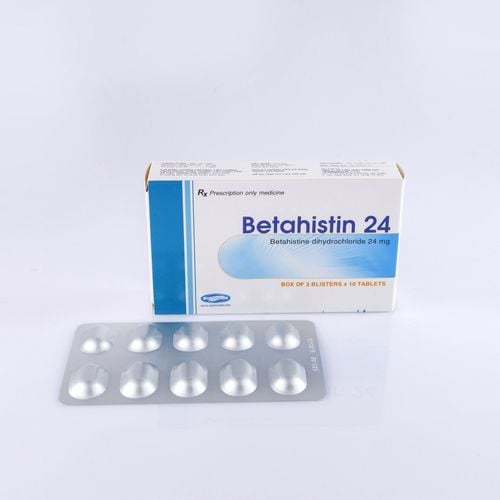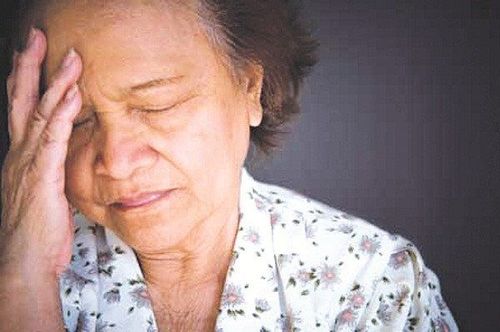This is an automatically translated article.
One of the manifestations of vestibular disorders is insomnia. Therefore, for people with insomnia, vestibular disorders always feel tired and want to find an effective treatment to end this condition. Join us to learn more about the vestibular disorder causing insomnia below to take measures to improve it when it occurs.
1. What is vestibular disorder?
Vestibular disorder is a disease that is not too strange for many people. This is a warning sign that the 8th nerve is damaged due to many different causes and is common in adults. At this time, the patient often has a feeling of loss of balance, dizziness, lightheadedness, dizziness, ringing in the ears, impaired concentration and body fatigue... Prolonged vestibular disorders will affect the life and work of the patient and those around him.
Moreover, vestibular disorders if left untreated for a long time also cause many health complications, increase the risk of stroke and easily lead to death. Therefore, the patient should not underestimate the unusual signs of the disease. Early detection and treatment will help limit the progression of the disease, as well as avoid risks to yourself.
2. Causes of vestibular disorders
According to experts, there are many causes of vestibular disorders, which may be due to:
Low blood pressure, cerebral ischemia, stroke and cardiovascular diseases... blood vessel. Due to anxiety, stress, stress, psychological pressure... causes the body to produce a large amount of the hormone cortisol, which damages the nervous system, including the 8th nerve, which is damaged. The vestibular system receives incorrect information and does not function properly. As a result of some diseases such as brain tumor, neuroma or neuritis, otitis media, etc. Due to polluted living environment, harsh weather and contaminated food... Factors that make vestibular disorders more and more common.
3. Symptoms of vestibular disorders
When having vestibular disorders, patients often have the following symptoms and manifestations:
Insomnia: Insomnia is the most common sign of vestibular disorders, patients often have difficulty sleeping, staying awake and having difficulty sleeping. Falling asleep, waking up in the middle and not being able to go back to sleep... The condition of vestibular disorders losing sleep for a long time will make the body tired and dizzy the next day, affecting health. Frequent dizziness and lightheadedness: When the vestibule is dysfunctional, the brain will not recognize the position of the head and lead to dizziness, dizziness when standing up, sitting down. Feeling wobbly and easy to fall: Mild vestibular disorder including feeling unsteady and unbalanced, easy to fall. This is due to asynchronous information from the vestibule, cerebellum, eye, and extrapyramidal. Visual sensitivity: People with vestibular disorders will have visual sensitivity such as dizziness and inability to see things clearly, sensitivity to light, eye discomfort when looking at crowded scenes Hearing loss: Side In terms of visual sensitivity, people with vestibular disorders are also affected in hearing, hearing is not as clear as before, tinnitus ... Vestibular disorders cause insomnia, making patients always in a state of fatigue and fatigue. fatigue and if left for a long time also adversely affect health, even increase the risk of stroke leading to death.
Therefore, patients need to take measures to treat vestibular disorders early to avoid affecting their daily activities and health.
4. Some effective ways to treat insomnia and vestibular disorders
If you are having a headache, insomnia, vestibular disorder but do not know how to treat and improve this condition, immediately apply the following ways:
4.1 Have a scientific diet As recommended by the doctors Scientists, patients with vestibular disorders and insomnia can be improved by having a scientific and nutritious diet. In particular, it is necessary to add foods rich in fiber and essential vitamins for the body.
Immune-boosting fiber-rich foods are found in dark green vegetables and fresh fruits such as: broccoli, spinach, okra, asparagus, cauliflower, tomatoes, oranges, squash corn, lemon, tangerine, grapefruit.
Foods rich in vitamins support a healthy nervous system and ease the symptoms of headaches, dizziness, and vertigo of vestibular disorders. Foods containing many essential vitamins include:
Vitamin B3 is found in spinach, bread, orange juice, white beans and peanuts. Vitamin B6 is found in foods such as fish, skinless chicken, apples, bananas, papayas, avocados, almonds, walnuts, and whole grains. Vitamin C is found in many fruits such as oranges, lemons, grapefruits, pineapples, kiwis and vegetables such as broccoli, broccoli, tomatoes and red peppers. Vitamin D is found in foods such as meat, fish, eggs, milk, legumes and whole grains. In addition to the above foods to improve vestibular disorders that cause insomnia, patients also need to avoid alcohol, beer, coffee, smoking, fatty foods... Because of these things. This makes the sleep disorder worse.
4.2 Change reasonable living habits Changing scientific and reasonable living habits is also a way to help improve insomnia. Therefore, the patient should implement healthy living habits such as:
Exercise every day with gentle movements such as walking, yoga and nourishing exercises. Perform vestibular disorders specifically for the eyes, head and whole body to help quickly improve symptoms of dizziness, lightheadedness, headache, and insomnia. Avoid standing up or sitting down suddenly, which will make you dizzy and even fall. Keep the pillow moderately high when sleeping to help blood circulate better to avoid venous congestion causing lack of oxygen that makes it difficult to sleep. Get enough sleep and avoid staying up late to not exhaust your body, lose sleep... Avoid sitting for too long, every 1-2 hours you should get up and walk around to avoid causing stress on your nerves. 4.3 Acupressure and massage Methods of pressing, pressing and massaging will also help patients reduce symptoms of vestibular disorders such as dizziness, dizziness, tinnitus, insomnia and help blood circulation.
You can apply massage and acupressure on the forehead, acupressure on the head or impact on the eye or ear acupoints...
When performing massage and acupressure exercises, you should do every The movement about 20-30 times in 5-10 will give the best effect.
4.4 Do the hand waving exercise The hand waving exercise helps to circulate blood and detoxify the body, thereby reducing symptoms of vestibular disorders. How to do it as follows:
Close your mouth and curl your tongue up to touch the gums of the upper jaw, eyes looking forward. Stand up straight, feet shoulder-width apart, keeping thighs and calves stretched and glutes straight. Raise your hands up in front of you at an angle of 30 degrees to your body so that your hands are parallel to the floor, fingers closed and cupped. Relax your hands and swing your hands back, when you wave your hands, hit them tightly and do your best. Applying this method twice a day and being persistent will help improve vestibular disorders, dizziness, and dizziness very well.
4.5 Foot soak Foot soak before going to bed is also an effective way to treat vestibular disorders causing insomnia that you should not ignore.
Soak your feet with warm water from 40-50 degrees for about 30 minutes before going to bed to help you sleep better, sleep better. In addition, foot baths also help improve blood circulation, prevent blood clots, detoxify the body, eliminate foot odor and relax the body.
You can use some natural ingredients such as ginger, lemongrass, green tea, salt seeds... to soak your feet very well.
Above are ways to treat insomnia at home that everyone can apply. However, if the condition is more severe, it is necessary to go to medical facilities to be examined, consulted and given appropriate and timely indications by a specialist.
Please dial HOTLINE for more information or register for an appointment HERE. Download MyVinmec app to make appointments faster and to manage your bookings easily.













